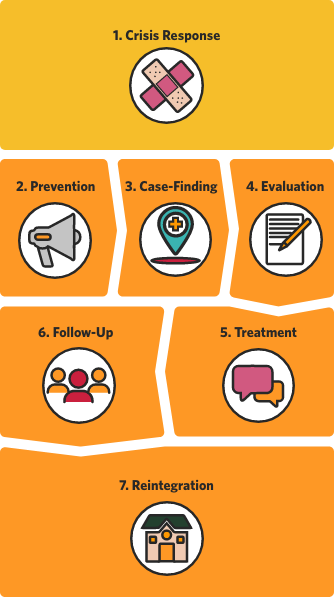PIH Mental Health Value Chain
The PIH Mental Health Value Chain is a map of the care delivery system and describes key elements essential in delivering quality, high-value care for mental health patients. It is a core component of the PIH Service Delivery Planning Matrix and supports planning and local implementation across PIH sites. Emphasizing PIH's commitment to progressive decentralization, the Value Chain highlights key elements for care at health facility and community levels. This Value Chain can be adapted to fit local and programmatic needs and context. s
The Value Chain is divided into seven core components organized according to a patient's pathway through the health system. Explore each component and associated resources in more detail by clicking on the Value Chain diagram below.

Learn more about the value chain

Crisis Response
This section of the value chain links to guidelines and resources that support initial mental health and psychosocial responses during times of crisis. These have been developed based on PIH’s response during the 2010 Haiti Earthquake, the 2014-16 Ebola outbreak in western Africa, and COVID-19. The PIH Cross-Site Mental Health team leveraged their existing learning collaborative to respond to the COVID-19 crisis, support service coordination & adaptation, and collaborate on a cross-site MHPSS training package.
As part of PIH’s COVID-19 response, the Peru team provided community mental health interventions and psychosocial support by developing a Spanish and Quechua chat bot in COVID-19 hotspots such as Lima. Similarly, the Sierra Leone team established a crisis hotline and psychological first aid (PFA) to confirm cases, link patients to care, and provide remote psychosocial support.

Prevention
At the health facility level, prevention includes efforts to reduce stigma among health system staff and to educate health practitioners regarding mental health. In Haiti and Sierra Leone, PIH utilizes community health workers to conduct psychoeducation sessions and stigma reduction activities. Community leaders such as traditional healers and teachers often play a large role in prevention by identifying people with mental health challenges and referring them to care.
At the community level, prevention efforts address common stressors contributing to mental health conditions and foster community support networks through support for poverty reduction, stigma reduction, and mental health education activities. Both Lesotho and Peru have piloted CASITA, an early childhood development program centered around improving caregiver-child interactions.

Case-Finding
Case-finding involves efforts to identify persons living with mental health conditions and refer them to appropriate care. This section of the value chain links to helpful screening tools and models for referral and case management that may be adapted for varying contexts and needs. In Lesotho, this is done by integrating mental health screening into routine, facility-based health services for multidrug-resistant tuberculosis. Sites like Mexico, Haiti, and Liberia rely on their extensive network of community health workers to help identify patients and bridge innovative mental health services between communities and facilities.

Assessment
Evaluation at the health facility and community level ensures that persons living with mental health conditions receive proper diagnosis and are linked to appropriate treatment. This section of the value chain links to clinical assessment tools and forms which may be adapted for local contexts.
At the facility level, Malawi and Peru are implementing their own locally-tailored interventions to address perinatal and postnatal depression in pregnant women. In the community, Mexico conducted a study in 2016 to locally validate the PHQ-9 tool that allows community health workers and physicians to screen and evaluate routine depression care in rural areas. Sierra Leone is focusing on community evaluation improvements via the integration of electronic medical records and digital data collection in order to enhance the efficiency of appropriate services.

Treatment
Treatment involves ensuring that patients are provided with appropriate quality care, support, and medications as necessary to manage common mental health conditions and severe mental health conditions. This section of the value chain highlights psychotherapy interventions and provides resources for formulary and medication guidance. It shares insights on how treatment can be adapted for community-level care across sites like Haiti and Liberia, or how to integrate treatment into already existing health programs. Rwanda is integrating psychotherapy programs into its primary care system and providing psychotherapeutic care outside the capital for the first time, and Sierra Leone is building out a continuum of care between its community mental health work the district of Kono and its newly renovated and improved Sierra Leone Psychiatric Teaching Hospital, sub-Saharan Africa’s oldest psychiatric hospital.

Follow-Up
Follow-up involves efforts to monitor patients’ clinical improvement and functioning and to ensure that patients are supported for improved treatment adherence. This section of the value chain shares resources for clinical assessment, interventions for continued management of common mental health conditions, and examples of follow-up models which have been adapted for use across PIH sites. Sites like Kazakhstan and Malawi are infusing follow-up care pathways into their clinical programming at health facilities. In contrast, sites like Mexico and Rwanda focus on conducting community-based patient support with the help of community health workers.

Reintegration
Reintegration refers to efforts to support people living with mental health conditions in assimilating to daily life and within their communities. PIH’s holistic approaches for reintegration consider aspects including self-care and capacity building at the individual level; caretaker support and social assistance within the household; peer support, stigma reduction, and community engagement. Innovative approaches to reintegration across PIH sites include a homeless support program in Liberia and Sierra Leone, safe houses for women living with severe mental health conditions in Peru, and community-based psychosocial rehabilitation programs in Rwanda, Peru, and Liberia.